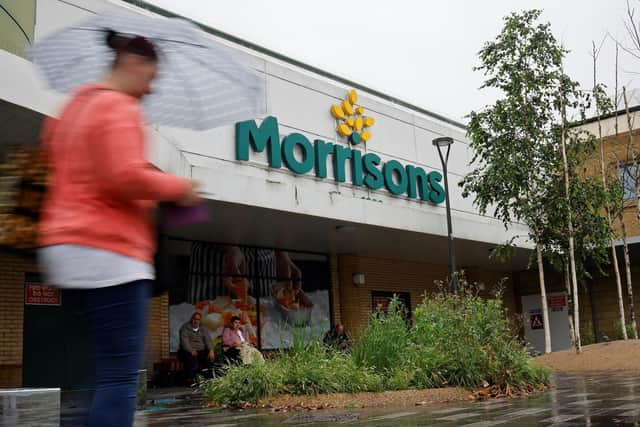Aldi overtakes Morrisons to jump into 'Supermarket Big Four'
But after the firm warned in June on the back of falling sales that it was facing a challenging trading environment due to a combination of inflationary pressure and “increasingly subdued consumer confidence” it has now been dealt a further blow after being surpassed by Aldi as the UK’s fourth largest supermarket.
Morrisons had previously held that title for 18 years after acquiring Safeway.
Advertisement
Hide AdAdvertisement
Hide AdThe latest figures from Kantar, which were published yesterday, show that in the 12 weeks to September 4 Morrisons’s market share has fallen to 9.1%, with Aldi’s rising to 9.3%. At the same point last year, Morrisons had a market share of 9.8% while Aldi was at 8.1%.


Both still trail the dominant big three of Tesco (26.9% market share), Sainsbury’s (14.6%) and Asda (14.1%).
Morrisons are keen to downplay the Kantar findings, claiming it has occurred largely for technical reasons.
A spokesperson said: "Market share is partly a function of new store openings and although Morrisons has not put on any significant new space for a while, some competitors are still opening many new stores. But customers don't really care about market share statistics - they care about value, quality, provenance and service and that is where our focus is going to remain."
Advertisement
Hide AdAdvertisement
Hide AdBut despite the confident tone, perhaps a more worrying figure than overall market share in the statistics is the one showing that expenditure at Morrisons stores has fallen by £2.85m to £2.74m.
The -4.1% drop contrasts sharply with the 3.8% rise in grocery sales at other supermarkets.
Particular winners were Aldi with a 18.7% rise and a 20.9% increase in sales for fellow budget supermarket Lidl.
The rise comes as grocery price inflation hit 12.4% during the past month, a new record based on Kantar’s data.
Advertisement
Hide AdAdvertisement
Hide AdIt means that with consumers facing extra shopping bills averaging £571 per year, there is perhaps little surprise they are turning to cheaper supermarkets.
The only other grocer to see its sales fall by a bigger percentage than Morrisons was the high-end Waitrose, which lost 4.7%.
However, other members of the traditional Big Four alongside Morrisons have managed to increase sales over the past year. Tesco’s rose by 1.9%, Sainsbury’s increased by 1.5% and Asda’s went up by 2.2%.
Fraser McKevitt, head of retail and consumer insight at Kantar, said: “It seems there’s no end in sight to grocery inflation as the rate at which food and drink prices are increasing continues to accelerate.
Advertisement
Hide AdAdvertisement
Hide Ad"Now standing at 12.4% for August, the latest figure means that the average annual grocery bill will go from £4,610 to £5,181 if consumers don’t make changes to what they buy and how they shop to cut costs. That’s an extra £571 a year. Categories like milk, butter and dog food are jumping up especially quickly at 31%, 25% and 29% respectively.
“In what is a fiercely competitive sector, supermarkets are reacting to make sure they’re seen to acknowledge the challenges consumers are facing and offer best value, in particular by expanding their own-label ranges.
“Their efforts seem to be well received by consumers with sales of the very cheapest value own-label products up by 33% this period versus a year ago and nearly one in four baskets containing one of these lines.
"Overall spending on all retailer own-label lines was £393 million higher during the latest four weeks, pushing own-label’s share of the market to 51.1%.”
Advertisement
Hide AdAdvertisement
Hide AdMr McKevitt said the shift in power between supermarket brands represents a substantial change to what has come before.
“Back at the start of the 2010s, Tesco, Sainsbury’s, Asda and Morrisons together accounted for over three quarters of the sector but that traditional big four is no more,” he said.
"The discounters have seen dramatic sales increases in recent months, bringing more and more customers through their doors. Aldi has done well to expand its shopper base, supported by consistent store openings, and with 14.2 million consumers visiting the grocer in the past three months.
"Meanwhile, for the fourth month in a row Lidl was the fastest growing grocer and recorded its strongest sales performance since October 2014.”
Advertisement
Hide AdAdvertisement
Hide AdSupermarkets were all given a boost in recent weeks by preparations for the return to school as the summer holidays ended.
Mr McKevitt said: “In the week before the schools reopened, to 4 September 2022, parents were clearly stocking up and getting ready for the return of the traditional packed lunch.
"Sales of sliced bread were up by 12% in comparison with the previous three weeks, while cheese snacks grew by 18% and children’s yoghurts by 57%.”
When the Morrisons takeover was approved by the Competition and Markets Authority back in June, the company’s chief executive David Potts said they could now properly begin work with Clayton, Dubilier & Rice on the “path ahead”.
Advertisement
Hide AdAdvertisement
Hide AdBut he warned: “Following hard on the heels of Covid, the cost-of-living crisis is another critical period for food retailers in the UK and there is important work ahead of us as we look to help customers and colleagues through these difficult economic times.”
Finding the way through that challenge will be key to ensuring Morrisons’s new ownership chapter is a successful one.